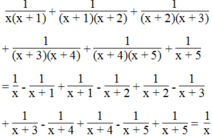

Hãy nhập câu hỏi của bạn vào đây, nếu là tài khoản VIP, bạn sẽ được ưu tiên trả lời.



\(\frac{x^4+x^3+x+1}{x^4-x^3+2x^2-x+1}\)
\(=\frac{x^3.\left(x+1\right)+\left(x+1\right)}{x^4-x^3+x^2+x^2-x+1}=\frac{\left(x^3+1\right).\left(x+1\right)}{x^2.\left(x^2-x+1\right)+\left(x^2-x+1\right)}=\frac{\left(x^3+1\right).\left(x+1\right)}{\left(x^2+1\right).\left(x^2-x+1\right)}\)
\(=\frac{\left(x+1\right)^2.\left(x^2-x+1\right)}{\left(x^2+1\right).\left(x^2-x+1\right)}=\frac{\left(x+1\right)^2}{x^2+1}\)
=> \(\frac{x^4+x^3+x+1}{x^4-x^3+2x^2-x+1}=\frac{\left(x+1\right)^2}{x^2+1}\)(đpcm)

a)
\(\dfrac{1}{x}-\dfrac{1}{x+1}=\dfrac{x+1-x}{x\left(x+1\right)}=\dfrac{1}{x\left(x+1\right)}\left(đpcm\right)\)
b)
\(\dfrac{1}{x\left(x+1\right)}+\dfrac{1}{\left(x+1\right)\left(x+2\right)}+\dfrac{1}{\left(x+2\right)\left(x+3\right)}+\dfrac{1}{\left(x+3\right)\left(x+4\right)}+\dfrac{1}{\left(x+4\right)\left(x+5\right)}+\dfrac{1}{x+5}\\ =\dfrac{1}{x}-\dfrac{1}{x+1}+\dfrac{1}{x+1}-\dfrac{1}{x+2}+\dfrac{1}{x+2}-\dfrac{1}{x+3}+\dfrac{1}{x+3}-\dfrac{1}{x+4}+\dfrac{1}{x+4}-\dfrac{1}{x+5}+\dfrac{1}{x+5}\\ =\dfrac{1}{x}\)

A=5; B=3; C=24 không phụ thuộc x; câu D thì mong bạn xem lại đề

\(\left(x-1\right)\left(x^4+x^3+x^2+x+1\right)\)
\(=x\left(x^4+x^3+x^2+x+1\right)-\left(x^4+x^3+x^2+x+1\right)\)
\(=x^5+x^4+x^3+x^2+x-x^4-x^3-x^2-x-1\)
\(=\left(x^5-x\right)+\left(x^4-x^4\right)+\left(x^3-x^3\right)+\left(x^2-x^2\right)+\left(x-x\right)\)
\(=x^5-1\) (đpcm)

\(A=\left(x^3+x^2+x\right)-\left(x^3+x^2\right)-x+5\)5
\(A=x^3+x^2+x-x^3-x^2-x+5\)
=> A=5
=> A luôn = 5 với mọi x => A không phụ thuộc vào x
\(B=x\left(2x+1\right)-x^2\left(x+2\right)+x^3-x+3\)
\(B=\left(2x^2+x\right)-\left(x^3+2x^2\right)+x^3-x+3\)
\(B=2x^2+x-x^3-2x^2+x^3-x+3\)
=> B= 3
=> B luôn =3 với mọi x => B không phụ thuộc vào x
\(C=4\left(6-x\right)+x^2\left(2+3x\right)-x\left(5x-4\right)+3x^2\left(1-x\right)\)
\(C=24-4x+2x^2+3x^3-5x^2+4x+3x^2-3x^3\)
C=24
=> C=24 với mọi x => C không phụ thuộc vào x
Câu D kí tự cuối có vẻ bạn gõ sai nên mình không làm được, sorry nhiều
A = x(x2 + x + 1) - x2(x + 1) - x + 5
A = x.x2 + x.x + x.1 + (-x2).x + (-x2).1 - x + 5
A = x3 + x2 + x - x3 - x2 - x + 5
A = (x3 - x3) + (x2 - x2) + (x - x) + 5
A = 0 + 0 + 0 + 5
A = 5
Vậy: Biểu thức không phụ thuộc giá trị của biến.
B = x(2x + 1) - x2(x + 2) + x3 - x + 3
B = x.2x + x.1 + (-x2).x + (-x2).2 + x3 - x + 3
B = 2x2 + x - x3 - 2x2 + x3 - x + 3
B = (2x2 - 2x2) + (x - x) + (-x3 + x3) + 3
B = 0 + 0 + 0 + 3
B = 3
Vậy: Biểu thức không phụ thuộc giá trị của biến.
C = 4(6 - x) + x2(2 + 3x) - x(5x - 4) + 3x2(1 - x)
C = 4.6 + 4.(-x) + x2.2 + x2.3x + (-x).5x + (-x).(-4) + 3x2.1 + 3x2.(-x)
C = 24 - 4x + 2x2 + 3x3 - 5x2 + 4x + 3x2 - 3x3
C = 24 + (-4x + 4x) + (2x2 - 5x2 + 3x2) + (3x3 - 3x3)
C = 24 + 0 + 0 + 0
C = 24
Vậy: Biểu thức không phụ thuộc giá trị của biến.
D viết sai thì chịu

a: \(VT=\dfrac{a^2\left(a-4\right)-\left(a-4\right)}{\left(a-2\right)\left(a^2+2a+4\right)-7a\left(a-2\right)}\)
\(=\dfrac{\left(a-4\right)\left(a-1\right)\left(a+1\right)}{\left(a-1\right)\left(a^2-5a+4\right)}\)
\(=\dfrac{\left(a-4\right)\left(a+1\right)}{\left(a-4\right)\left(a-1\right)}=\dfrac{a+1}{a-1}=VP\)
b: \(VT=\dfrac{x^3\left(x+1\right)+\left(x+1\right)}{x^4-x^3+x^2+x^2-x+1}\)
\(=\dfrac{\left(x+1\right)\left(x+1\right)\left(x^2-x+1\right)}{\left(x^2+1\right)\left(x^2-x+1\right)}\)
\(=\dfrac{\left(x+1\right)^2}{x^2+1}=VP\)

a, Ta có:\(\left(4x^2-2xy+y^2\right)\left(2x+y\right)\)
\(=8x^3+4x^2y-4x^2y-2xy^2+2xy^2+y^3\)
\(=8x^3+y^3\)
\(\Rightarrow\left(4x^2-2xy+y^2\right)\left(2x+y\right)=8x^3+y^3\)
b,Ta có: \(\left(x^2+x+1\right)\left(x^5-x^4+x^3-x+1\right)\)
\(=x^7-x^6+x^5-x^3+x^2+x^6-x^5+x^4-x^2+x+x^5-x^4+x^3-x+1\)
(rồi bạn nhóm vào trừ cho nhau)
\(=x^7+x^5+1\)

\(\dfrac{x^4-x^3-x+1}{x^4+x^3+3x^2+2x+2}\)
\(=\dfrac{\left(x-1\right)^2\left(x^2+x+1\right)}{\left(x^2+2\right)\left(x^2+x+1\right)}\)
\(=\dfrac{\left(x-1\right)^2}{x^2+2}\ge0\forall x\) (đpcm)
Dấu "=" xảy ra khi x = 1
Bn kia giải bài 1 r nên mk giải bài 2 nha!
Sửa lại:\(\dfrac{x^7+x^2+1}{x^8+x+1}\)
\(\dfrac{x^7+x^2+1}{x^8+x+1}=\dfrac{x^7-x+x^2+x+1}{x^8-x^2+x^2+x+1}\)
\(=\dfrac{x\left(x^6-1\right)+x^2+x+1}{x^2\left(x^6-1\right)+x^2+x+1}\)
\(=\dfrac{x\left(x^3-1\right)\left(x^3+1\right)+x^2+x+1}{x^2\left(x^3-1\right)\left(x^3+1\right)+x^2+x+1}\)
\(=\dfrac{x\left(x-1\right)\left(x^2+x+1\right)\left(x^3+1\right)+x^2+x+1}{x^2\left(x-1\right)\left(x^2+x+1\right)\left(x^3+1\right)+x^2+x+1}\)
\(=\dfrac{\left(x^2+x+1\right)\left(x^5-x^4+x^2-x+1\right)}{\left(x^2+x+1\right)(x^6-x^5+x^3-x^2+1)}\)
Cả tử và mẫu đều có nhân tử:\(x^2+x+1>1\Rightarrowđpcm\)

Bài 1:
ĐKXĐ: x≠1
Ta có: \(\frac{1}{x-1}+\frac{2x^2-5}{x^3-1}=\frac{4}{x^2+x+1}\)
\(\Leftrightarrow\frac{x^2+x+1}{\left(x-1\right)\left(x^2+x+1\right)}+\frac{2x^2-5}{\left(x-1\right)\left(x^2+x+1\right)}-\frac{4\left(x-1\right)}{\left(x^2+x-1\right)\left(x-1\right)}=0\)
\(\Leftrightarrow x^2+x+1+2x^2-5-4\left(x-1\right)=0\)
\(\Leftrightarrow x^2+x+1+2x^2-5-4x+4=0\)
\(\Leftrightarrow3x^2-3x=0\)
\(\Leftrightarrow3x\left(x-1\right)=0\)
Vì 3≠0
nên \(\left[{}\begin{matrix}x=0\\x-1=0\end{matrix}\right.\Leftrightarrow\left[{}\begin{matrix}x=0\\x=1\left(ktm\right)\end{matrix}\right.\Leftrightarrow x=0\)
Vậy: x=0
Bài 2:
ĐKXĐ: x≠2; x≠3; \(x\ne\frac{1}{2}\)
Ta có: \(\frac{x+4}{2x^2-5x+2}+\frac{x+1}{2x^2-7x+3}=\frac{2x+5}{2x^2-7x+3}\)
\(\Leftrightarrow\frac{x+4}{\left(x-2\right)\left(2x-1\right)}+\frac{x+1-\left(2x+5\right)}{\left(x-3\right)\left(2x-1\right)}=0\)
\(\Leftrightarrow\frac{x+4}{\left(x-2\right)\left(2x-1\right)}+\frac{x+1-2x-5}{\left(x-3\right)\left(2x-1\right)}=0\)
\(\Leftrightarrow\frac{\left(x+4\right)\left(x-3\right)}{\left(x-2\right)\left(2x-1\right)\left(x-3\right)}+\frac{\left(-x-4\right)\left(x-2\right)}{\left(x-3\right)\left(2x-1\right)\left(x-2\right)}=0\)
\(\Leftrightarrow x^2+x-12-x^2-2x+8=0\)
\(\Leftrightarrow-x-4=0\)
\(\Leftrightarrow-x=4\)
hay x=-4(tm)
Vậy: x=-4
Bài 3:
ĐKXĐ: x≠1; x≠-1
Ta có: \(\frac{x+1}{x-1}-\frac{x-1}{x+1}=3x\left(1-\frac{x-1}{x+1}\right)\)
\(\Leftrightarrow\frac{x+1}{x-1}-\frac{x-1}{x+1}=3x-\frac{3x\left(x-1\right)}{x+1}\)
\(\Leftrightarrow\frac{x+1}{x-1}-\frac{x-1}{x+1}-3x+\frac{3x\left(x-1\right)}{x+1}=0\)
\(\Leftrightarrow\frac{\left(x+1\right)\left(x+1\right)}{\left(x-1\right)\left(x+1\right)}-\frac{\left(x-1\right)\left(x-1\right)}{\left(x+1\right)\left(x-1\right)}-\frac{3x\left(x-1\right)\left(x+1\right)}{\left(x-1\right)\left(x+1\right)}+\frac{3x\left(x-1\right)\left(x-1\right)}{\left(x+1\right)\left(x-1\right)}=0\)
\(\Leftrightarrow\left(x^2+2x+1\right)-\left(x^2-2x+1\right)-3x\left(x^2-1\right)+3x\left(x^2-2x+1\right)=0\)
\(\Leftrightarrow x^2+2x+1-x^2+2x-1-3x^3+3x+3x^3-6x^2+3x=0\)
\(\Leftrightarrow-6x^2+10x=0\)
\(\Leftrightarrow2x\left(-3x+5\right)=0\)
Vì 2≠0
nên \(\left[{}\begin{matrix}x=0\\-3x+5=0\end{matrix}\right.\Leftrightarrow\left[{}\begin{matrix}x=0\\-3x=-5\end{matrix}\right.\Leftrightarrow\left[{}\begin{matrix}x=0\\x=\frac{5}{3}\end{matrix}\right.\)
Vậy: \(x\in\left\{0;\frac{5}{3}\right\}\)
Bài 4:
ĐKXĐ: x≠1; x≠-3
Ta có: \(\frac{2x}{x-1}+\frac{4}{x^2+2x-3}=\frac{2x-5}{x+3}\)
\(\Leftrightarrow\frac{2x\left(x+3\right)}{\left(x-1\right)\left(x+3\right)}+\frac{4}{\left(x-1\right)\left(x+3\right)}-\frac{\left(2x-5\right)\left(x-1\right)}{\left(x+3\right)\left(x-1\right)}=0\)
\(\Leftrightarrow2x^2+6x+4-\left(2x^2-7x+5\right)=0\)
\(\Leftrightarrow2x^2+6x+4-2x^2+7x-5=0\)
\(\Leftrightarrow13x-1=0\)
\(\Leftrightarrow13x=1\)
hay \(x=\frac{1}{13}\)(tm)
Vậy: \(x=\frac{1}{13}\)
Bài 5:
ĐKXĐ: x≠1; x≠-2
Ta có: \(\frac{1}{x-1}-\frac{7}{x+2}=\frac{3}{x^2+x-2}\)
\(\Leftrightarrow\frac{x+2}{\left(x-1\right)\left(x+2\right)}-\frac{7\left(x-1\right)}{\left(x+2\right)\left(x-1\right)}-\frac{3}{\left(x+2\right)\left(x-1\right)}=0\)
\(\Leftrightarrow x+2-7\left(x-1\right)-3=0\)
\(\Leftrightarrow x+2-7x+7-3=0\)
\(\Leftrightarrow-6x+6=0\)
\(\Leftrightarrow-6\left(x-1\right)=0\)
Vì -6≠0
nên x-1=0
hay x=1(ktm)
Vậy: x∈∅
Bài 6:
ĐKXĐ: x≠4; x≠2
Ta có: \(\frac{x+3}{x-4}+\frac{x-1}{x-2}=\frac{2}{6x-8-x^2}\)
\(\Leftrightarrow\frac{x+3}{x-4}+\frac{x-1}{x-2}-\frac{2}{6x-8-x^2}=0\)
\(\Leftrightarrow\frac{x+3}{x-4}+\frac{x-1}{x-2}-\frac{2}{-\left(x^2-6x+8\right)}=0\)
\(\Leftrightarrow\frac{x+3}{x-4}+\frac{x-1}{x-2}+\frac{2}{\left(x-4\right)\left(x-2\right)}=0\)
\(\Leftrightarrow\frac{\left(x+3\right)\left(x-2\right)}{\left(x-4\right)\left(x-2\right)}+\frac{\left(x-1\right)\left(x-4\right)}{\left(x-2\right)\left(x-4\right)}+\frac{2}{\left(x-4\right)\left(x-2\right)}=0\)
\(\Leftrightarrow x^2+x-6+x^2-5x+4+2=0\)
\(\Leftrightarrow2x^2-4x=0\)
\(\Leftrightarrow2x\left(x-2\right)=0\)
Vì 2≠0
nên \(\left[{}\begin{matrix}x=0\\x-2=0\end{matrix}\right.\Leftrightarrow\left[{}\begin{matrix}x=0\\x=2\left(ktm\right)\end{matrix}\right.\Leftrightarrow x=0\)
Vậy: x=0
Bài 7:
ĐKXĐ: x≠1; x≠-2; x≠-1
Ta có: \(\frac{1}{x-1}-\frac{7}{x+2}=\frac{3}{1-x^2}\)
\(\Leftrightarrow\frac{1}{x-1}-\frac{7}{x+2}+\frac{3}{x^2-1}=0\)
\(\Leftrightarrow\frac{\left(x+1\right)\left(x+2\right)}{\left(x-1\right)\left(x+1\right)\left(x+2\right)}-\frac{7\left(x-1\right)\left(x+1\right)}{\left(x+2\right)\left(x-1\right)\left(x+1\right)}+\frac{3\left(x+2\right)}{\left(x-1\right)\left(x+1\right)\left(x+2\right)}=0\)
\(\Leftrightarrow x^2+3x+2-7\left(x^2-1\right)+3x+6=0\)
\(\Leftrightarrow x^2+3x+2-7x^2+7x+3x+6=0\)
\(\Leftrightarrow-6x^2+13x+8=0\)
\(\Leftrightarrow-6x^2+16x-3x+8=0\)
\(\Leftrightarrow2x\left(-3x+8\right)+\left(-3x+8\right)=0\)
\(\Leftrightarrow\left(-3x+8\right)\left(2x+1\right)=0\)
\(\Leftrightarrow\left[{}\begin{matrix}-3x+8=0\\2x+1=0\end{matrix}\right.\Leftrightarrow\left[{}\begin{matrix}-3x=-8\\2x=-1\end{matrix}\right.\Leftrightarrow\left[{}\begin{matrix}x=\frac{8}{3}\\x=\frac{-1}{2}\end{matrix}\right.\)
Vậy: \(x\in\left\{\frac{8}{3};\frac{-1}{2}\right\}\)
\( 1)\dfrac{1}{{x - 1}} + \dfrac{{2{x^2} - 5}}{{{x^3} - 1}} = \dfrac{4}{{{x^2} + x + 1}}\\ DK:x \ne 1\\ \Leftrightarrow \dfrac{{{x^2} + x + 1 + 2{x^2} - 5}}{{{x^3} - 1}} = \dfrac{{4\left( {x - 1} \right)}}{{{x^3} - 1}}\\ \Leftrightarrow {x^2} + x + 1 + 2{x^2} - 5 = 4x - 4\\ \Leftrightarrow 3{x^2} - 3x = 0\\ \Leftrightarrow 3x\left( {x - 1} \right) = 0 \Leftrightarrow \left[ \begin{array}{l} x = 0\left( {tm} \right)\\ x = 1\left( {ktm} \right) \end{array} \right.\\ 2)\dfrac{{x + 4}}{{2{x^2} - 5x + 2}} + \dfrac{{x + 1}}{{2{x^2} - 7x + 3}} = \dfrac{{2x + 5}}{{2{x^2} - 7x + 3}}\\ + DK:x \ne \dfrac{1}{2};x \ne 2;x \ne 3\\ \Leftrightarrow \dfrac{{x + 4}}{{\left( {2x - 1} \right)\left( {x - 2} \right)}} + \dfrac{{x + 1}}{{\left( {x - 3} \right)\left( {2x - 1} \right)}} = \dfrac{{2x + 5}}{{\left( {x - 3} \right)\left( {2x - 1} \right)}}\\ \Leftrightarrow \left( {x + 4} \right)\left( {x - 3} \right) + \left( {x + 1} \right)\left( {x - 2} \right) = \left( {2x + 5} \right)\left( {x - 2} \right)\\ \Leftrightarrow {x^2} + x - 12 + {x^2} - x - 2 = 2{x^2} + x - 10\\ \Leftrightarrow x = - 4\left( {tm} \right)\\ 3)\dfrac{{x + 1}}{{x - 1}} - \dfrac{{x - 1}}{{x + 1}} = 3x\left( {1 - \dfrac{{x - 1}}{{x + 1}}} \right)\\ DK:x \ne \pm 1\\ \Leftrightarrow {\left( {x + 1} \right)^2} - {\left( {x - 1} \right)^2} = 3x\left( {x - 1} \right)\left( {x + 1 - x + 1} \right)\\ \Leftrightarrow {x^2} + 2x + 1 - {x^2} + 2x - 1 = 6x\left( {x - 1} \right)\\ \Leftrightarrow 4x = 6{x^2} - 6x\\ \Leftrightarrow 2x\left( {3x - 5} \right) = 0 \Leftrightarrow \left[ \begin{array}{l} x = 0\\ x = \dfrac{5}{3} \end{array} \right.\left( {tm} \right) \)
Còn lại tương tự mà làm nhé!